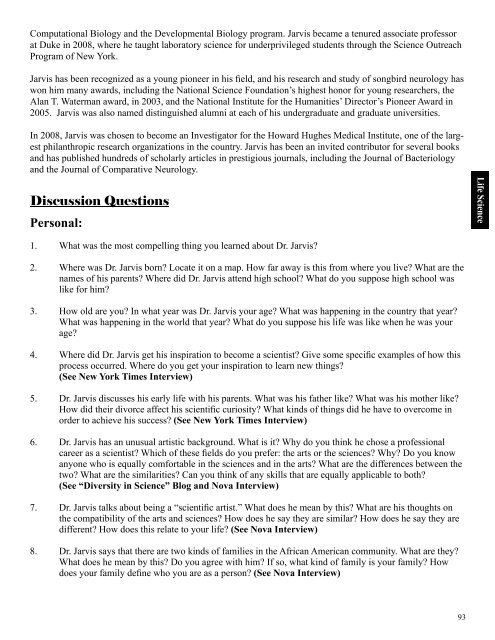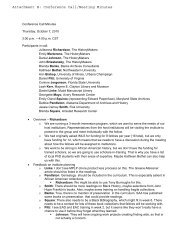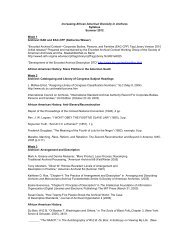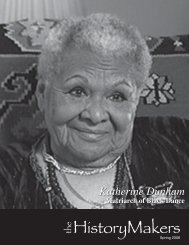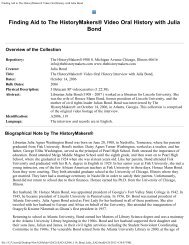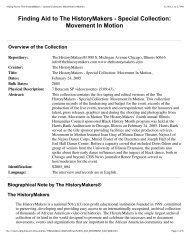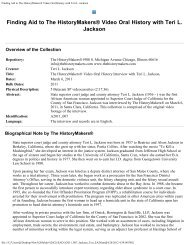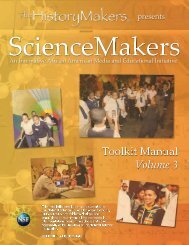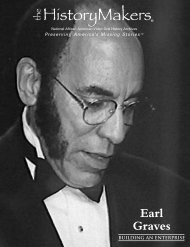ScienceMakers Toolkit Manual - The History Makers
ScienceMakers Toolkit Manual - The History Makers
ScienceMakers Toolkit Manual - The History Makers
Create successful ePaper yourself
Turn your PDF publications into a flip-book with our unique Google optimized e-Paper software.
Computational Biology and the Developmental Biology program. Jarvis became a tenured associate professor<br />
at Duke in 2008, where he taught laboratory science for underprivileged students through the Science Outreach<br />
Program of New York.<br />
Jarvis has been recognized as a young pioneer in his fi eld, and his research and study of songbird neurology has<br />
won him many awards, including the National Science Foundation’s highest honor for young researchers, the<br />
Alan T. Waterman award, in 2003, and the National Institute for the Humanities’ Director’s Pioneer Award in<br />
2005. Jarvis was also named distinguished alumni at each of his undergraduate and graduate universities.<br />
In 2008, Jarvis was chosen to become an Investigator for the Howard Hughes Medical Institute, one of the largest<br />
philanthropic research organizations in the country. Jarvis has been an invited contributor for several books<br />
and has published hundreds of scholarly articles in prestigious journals, including the Journal of Bacteriology<br />
and the Journal of Comparative Neurology.<br />
Discussion Questions<br />
Personal:<br />
1. What was the most compelling thing you learned about Dr. Jarvis?<br />
2. Where was Dr. Jarvis born? Locate it on a map. How far away is this from where you live? What are the<br />
names of his parents? Where did Dr. Jarvis attend high school? What do you suppose high school was<br />
like for him?<br />
3. How old are you? In what year was Dr. Jarvis your age? What was happening in the country that year?<br />
What was happening in the world that year? What do you suppose his life was like when he was your<br />
age?<br />
4. Where did Dr. Jarvis get his inspiration to become a scientist? Give some specifi c examples of how this<br />
process occurred. Where do you get your inspiration to learn new things?<br />
(See New York Times Interview)<br />
5. Dr. Jarvis discusses his early life with his parents. What was his father like? What was his mother like?<br />
How did their divorce affect his scientifi c curiosity? What kinds of things did he have to overcome in<br />
order to achieve his success? (See New York Times Interview)<br />
6. Dr. Jarvis has an unusual artistic background. What is it? Why do you think he chose a professional<br />
career as a scientist? Which of these fi elds do you prefer: the arts or the sciences? Why? Do you know<br />
anyone who is equally comfortable in the sciences and in the arts? What are the differences between the<br />
two? What are the similarities? Can you think of any skills that are equally applicable to both?<br />
(See “Diversity in Science” Blog and Nova Interview)<br />
7. Dr. Jarvis talks about being a “scientifi c artist.” What does he mean by this? What are his thoughts on<br />
the compatibility of the arts and sciences? How does he say they are similar? How does he say they are<br />
different? How does this relate to your life? (See Nova Interview)<br />
8. Dr. Jarvis says that there are two kinds of families in the African American community. What are they?<br />
What does he mean by this? Do you agree with him? If so, what kind of family is your family? How<br />
does your family defi ne who you are as a person? (See Nova Interview)<br />
93<br />
Life Science


